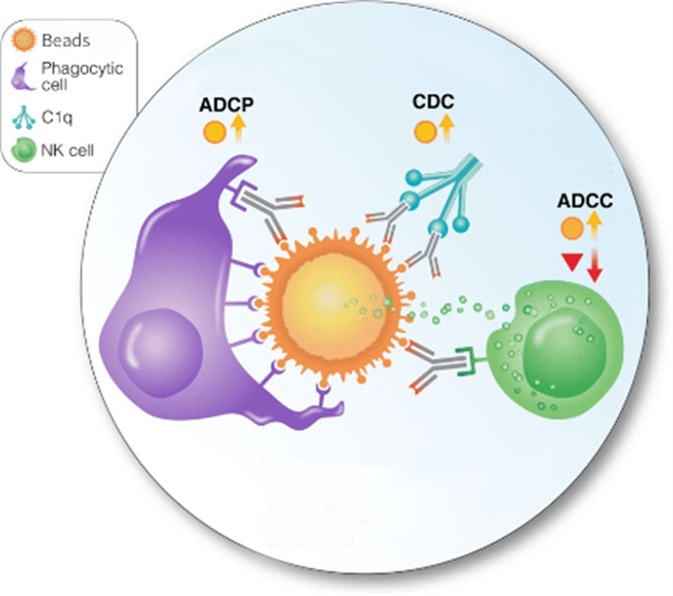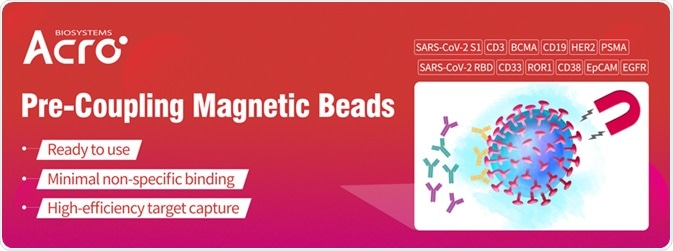Magnetic beads pre-coupled with biotinylated proteins are ideal for highly efficient immunocapture, biopanning and virus capture with the help of a magnetic field.
In addition to these common applications, beads can also be utilized in antibody-dependent cellular phagocytosis (ADCP) assay, an experiment commonly carried out in virus or tumor studies, to assess the phagocytic potential of activated effector cells.

Figure 1. Antibody-mediated cellular phagocytosis (ADCP) of protein-coupled beads. Image Credit: ACROBiosystems
A recent study of HIV-1 described the utilization of fluorescent bead-based flow cytometric assay to quantify cellular phagocytosis of GP41-coupled beads by monocytes.
In the standard bead ADCP assay carried out, protein-coupled fluorescent beads are incubated with antibodies to be adequately opsonized before their addition to phagocytic cells; flow cytometry is then used to analyze the beads uptake by cells.
They incorporated a Specific Hybridization Internalization Probe (SHIP) to further differentiate the surface-attached beads from the intracellular beads. This selectively inactivated the SHIP fluorescence of the attached beads but not of those truly internalized.
Using this method, the number of beads phagocytosed by a single effector cell can also be identified accurately from the fluorescence level. This method was reported as being highly repeatable and efficient.
The detection of the phagocytosed beads can be carried out using fluorescence technology or electronic microscopy (EM) In bead-based ADCP assay. ACROBiosystems has developed a list of beads products that are suitable to be employed in ADCP assays and visualized conveniently with EM.
Reliable simulation data can be supplied by these 2 um beads by mimicking antigen presentation on different tumor cells or virus-infected cells. Furthermore, utilizing bead-based assay to measure Fc-mediated phagocytosis has benefits over real cell assays for convenience, cost, its ability to manipulate, and that it can be stored for a long period of time.

Image Credit: ACROBiosystems
References
- Duchemin M, Tudor D, Cottignies-Calamarte A, Bomsel M. Antibody-Dependent Cellular Phagocytosis of HIV-1-Infected Cells Is Efficiently Triggered by IgA Targeting HIV-1 Envelope Subunit gp41. Front Immunol. 2020 Jun 9;11:1141. doi: 10.3389. Retrieved from https://www.frontiersin.org/articles/10.3389/fimmu.2020.01141/full
- Lloyd, Y.M., Ngati, E.P., Salanti, A. et al. A versatile, high through-put, bead-based phagocytosis assay for Plasmodium falciparum. Sci Rep 7, 14705 (2017). Retrieved from https://doi.org/10.1038/s41598-017-13900-4
About ACROBiosystems
ACROBiosystems is a cornerstone enterprise of the pharmaceutical and biotechnology industries. Their mission is to help overcome challenges with innovative tools and solutions from discovery to the clinic. They supply life science tools designed to be used in discovery research and scalable to the clinical phase and beyond. By consistently adapting to new regulatory challenges and guidelines, ACROBiosystems delivers solutions, whether it comes through recombinant proteins, antibodies, assay kits, GMP-grade reagents, or custom services. ACROBiosystems empower scientists and engineers dedicated towards innovation to simplify and accelerate the development of new, better, and more affordable medicine.
Sponsored Content Policy: News-Medical.net publishes articles and related content that may be derived from sources where we have existing commercial relationships, provided such content adds value to the core editorial ethos of News-Medical.Net which is to educate and inform site visitors interested in medical research, science, medical devices and treatments.